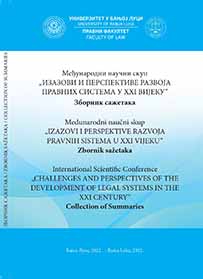ПОЗИТИВНОПРАВНО УРЕЂЕЊЕ УПРАВЉАЊА ЈАВНИМ ДУГОМ У РЕПУБЛИЦИ СРПСКОЈ У ВРИЈЕМЕ ИНФЛАЦИЈЕ: ОПАСНОСТ ИЛИ ШАНСА?
PUBLIC DEBT DURING INFLATION – DANGER OR OPPORTUNITY?
Author(s): Bojana Vasiljević PoljaševićSubject(s): Law, Constitution, Jurisprudence, Civil Law, Law on Economics, Labour and Social Security Law
Published by: Правни факултет Универзитета у Бањој Луци
Keywords: public debt; inflation;
Summary/Abstract: In the last two years, which were marked, first of all, by the Covid-19 pandemic, with interrupted supply chains, reduced economic activity and the level of employment, the recommendations of financial theorists and practitioners, but also of all credible international financial institutions, were that countries all over the world should take on additional debts in order to maintain the economy and the population through consumption, maintain economic growth and development, maintain the number of employees etc. According to the IMF global debt database, the global debt grew in 2020 by 28 percentage points, that is, the same debt grew to 256% of (world) GDP in 2020. In the observed debt, public (global) debt had a share of almost 40% in 2020, which represents its largest share since the mid-60s of the last century. On the other hand, the time of cheap money and low interest rates is definitely over. Today, registered inflation rates are at a historical maximum around the world, and one of the measures used to try to calm inflation is the tightening of monetary policy, i.e. the increase of reference interest rates. On the other hand, aggressive monetary policies will consequently lead or have already led to a change in capital prices on all money markets, that is, they have led to an “increase in price” of debt, both new and servicing existing debt. This paper will analyze the impact and effects of inflation on debt, both in the short and long term. In addition, this paper will provide an overview of various alternatives that “helped” in reducing the debt burden in the past, and will provide an answer to the question of whether the existing legal framework for public debt management in the Republic of Srpska is adequate for the management of the mentioned debt in the future “hard to predict” period.
Journal: Зборник радова Међународни научни скуп „Изазови и перспективе развоја правних система у XXI вијеку"
- Issue Year: 2022
- Issue No: 2
- Page Range: 383-400
- Page Count: 18
- Language: Serbian

